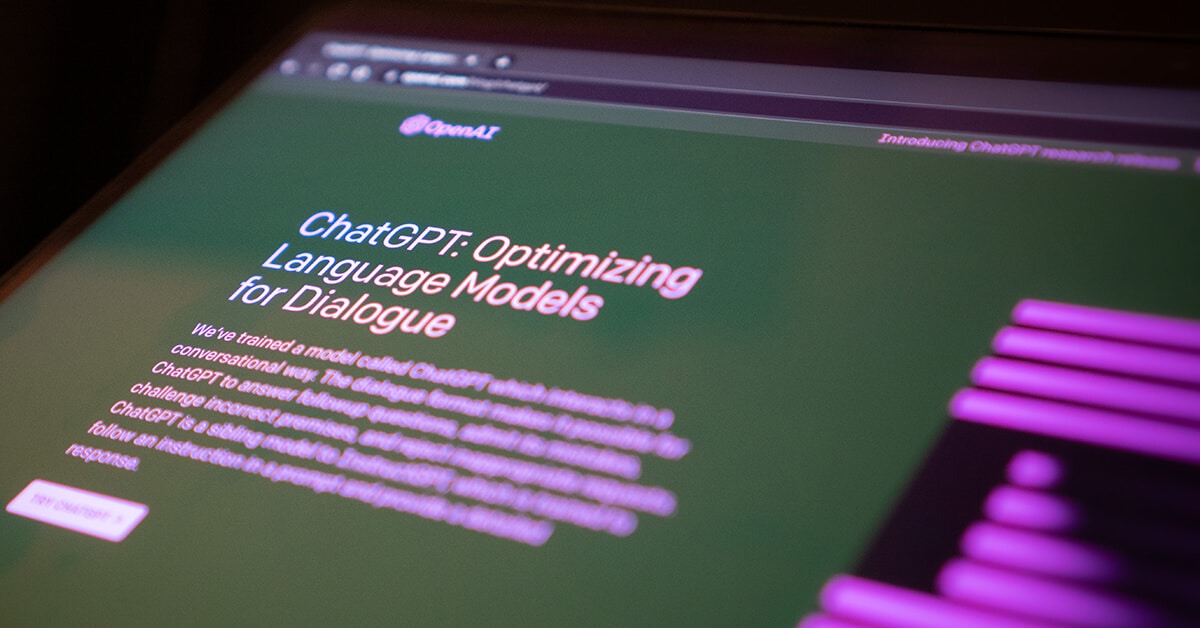ChatGPT quiz options might seem a little intimidating at first glance. After all, artificial intelligence is an incredibly advanced field of computer science. But that also makes it an essential part of the modern tech landscape. And by learning a few foundational concepts, you’ll quickly discover that you’ve mastered everything you need to know to ace the quiz.
Quick Menu:
- What Is Artificial Intelligence?
- What Is OpenAI?
- What Is ChatGPT?
- How Does ChatGPT Work?
- What Is the Difference Between ChatGPT-3 and ChatGPT-4?
- Test Your Knowledge with the ChatGPT Quiz
- From ChatGPT Quiz to Its Foundational Elements
- Fit Your Results From the ChatGPT Quiz Into an AR Context
- The ChatGPT Quiz as a Roadmap to Virtual Reality
What Is Artificial Intelligence?
Artificial intelligence (AI) is a complex subject but can be understood in relatively simple terms. It’s essentially the ability that allows computers and computer-controlled robots to accomplish tasks traditionally requiring human intelligence or judgment. AI lacks the versatility that lets humans tackle varied challenges. But what an AI excels at is specialization. An AI focused on a specific concept or context may be able to match a human’s output.
The key element often comes down to calculating probabilities and taking the action with the highest chance of success. Machine learning (ML) can further improve AI’s unsupervised ability to adapt to new information. Deep learning techniques can handle larger datasets and encompass video, images, and text. A ChatGPT quiz might touch on either form of AI or applications such as speech recognition, expert systems, or natural language processing.
What Is OpenAI?
OpenAI will almost inevitably come up quite a bit on a ChatGPT quiz. After all, this American AI research lab is responsible for ChatGPT and many of its fundamental components. And OpenAI’s underlying philosophy is also essential to fully understanding ChatGPT. There’s a strong, accepted, metaverse meaning. But concepts behind the underlying meaning of AI are fuzzier. OpenAI seeks to change this because of AI’s potential for serious social harm.
The founders wanted to ensure that an AI meaning would be tied to proper use and careful technology implementation. The company seeks to create artificial general intelligence that’s safe and which will benefit humanity. Note that in 2019 OpenAI went from a nonprofit to an LLC under the title of OpenAI Inc. While incorporated, the “open” element of the company holds. OpenAI seeks to collaborate with other researchers safely and remain open to the public.
Video: Robots that Learn
What Is ChatGPT?
The next element to focus on within a ChatGPT quiz is ChatGPT itself. ChatGPT is similar to the automated text services or help systems you might have seen on some websites. They and ChatGPT, share a similar basic operation principle. You send a text to the system, and the AI writes a response. But ChatGPT generally differs from those systems in terms of underlying technologies. Like those help systems, it’s a generative AI.
It generates text based on human input. But GPT, General Pre-trained Transformer, models uniquely preprocess information. GPT, in general, and ChatGPT, in particular, use reinforced learning through special reward models that grade responses to find the highest-quality text. This technique is combined with machine learning to make a system that can teach itself some concepts to improve its future responses.
How Does ChatGPT Work?
The Generative Pre-Trained Transformer System (GPT) uses highly advanced techniques to find patterns within data sequences. The standard system used by ChatGPT is the third iteration of this technique. That’s why you might hear ChatGPT, referred to as GPT-3; it uses the third version of GPT to analyze text for significant patterns. ChatGPT is further aided by the fact that the GPT-3 model is trained on a truly immense amount of textual data.
It was first presented with online text to find patterns that essentially taught it what human language is. Then, transcripts of human conversations and more are fed into the model using these newly learned rules for language. Users continue to refine the results through their feedback. For example, users can click a thumbs-up or down icon within ChatGPT to rank results. This feedback is an integral part of a ChatGPT quiz and ChatGPT.
Video: How ChatGPT Works Technically | ChatGPT Architecture
What Is the Difference Between ChatGPT-3 and ChatGPT-4?
Remember not to assume the meaning of the term GPT on a ChatGPT quiz. ChatGPT indeed uses GPT-3.5. However, it also gives users the option to use GPT-4. GPT-4 is over ten times more potent than GPT-3.5. One of the main improvements in GPT-4 has come from its ability to grasp the nuance in text. This results in far more coherent and accurate responses. Additionally, GPT-4 has a significantly larger context size. GPT-3.5 is limited to 4,000 tokens for text input and output. This is roughly equivalent to 3,125 words. But GPT-4 raises this limit to 32,000 tokens. GPT-4’s combination of extra nuance and greater context size means it can pick up on subtle elements like a user’s mood. Likewise, GPT-4 can answer questions by comparing context from different sources. GPT-3.5 often struggles to connect multiple concepts. GPT-4’s broad approach produces more impressive results.
Video: Introducing GPT-4
6 Ways to Use ChatGPT
A ChatGPT quiz will typically cover various subjects simply because ChatGPT can be used for many things. But the following are among the most popular uses for ChatGPT.
Social Media Content
Social media is one of the best ways to connect with current and potential customers. However, it’s often a difficult and tedious process. A social media post’s chances to go viral are primarily a numbers game. Put out more content, and your chances go up. As you’ve seen with the ChatGPT quiz, the AI does a fantastic job of creating rich text at a rapid pace. This includes social media posts. And many companies are using ChatGPT to increase their social media return by increasing their online content.
Web Content
Blogs and other content-rich web services are among the best ways to get eyes onto your site. This typically leads to increased conversion rates, But creating that content can be challenging. But studying for the ChatGPT quiz ensures you probably have a good idea of the perfect solution – ChatGPT. Some companies are using it to write outlines. And many even use it to create entire blog posts. Even using ChatGPT to generate a headline for your blog posts can be a huge time savor when wracking your tired mind for the next great idea.

Image attribution: Cities Today
Coding & Web Development Tool
ChatGPT isn’t just an amazing piece of computer code. It can also be used to write computer code. When taking the ChatGPT quiz, remember that the system can even convert code from one programming language to another. It excels at everything from debugging syntax errors to crafting functions or illustrating code logic. Some programmers even use it to create complex liquid code in snippet form that clients can use. These specialized code snippets might be interchangeably used for membership programs, product or database filtering, data tracking, etc. The only limitation is familiarity with ChatGPT’s prompts.
Video: How to Use ChatGPT as a Powerful Tool for Programming
Summarize & Extract KPIs
Data analysis almost always comes up in discussions of AI. And you’ve already seen many references to it while preparing for the ChatGPT quiz. While it’s used for many forms of business review, it’s particularly effective with KPI metrics and reports. This process typically takes full teams that laboriously pour over data points. But ChatGPT can rapidly iterate it through it all on its own. ChatGPT’s proficiency with the task is essential. But the most significant benefit is speed. It moves far faster than humans. And unlike people, it can go 24/7 until the KPI metrics are finalized and presented.
Produce Business Documents
You’ve seen some examples of business and ChatGPT coming together on a ChatGPT quiz. But remember that companies work with highly varied data. Until recently, only humans could work through diverse data types, such as letters, financial papers, PowerPoint presentations, and more, to work with them. But ChatGPT can analyze these diverse data points and create new ideas from the perspective of different specialists. For example, it could advise analysts about risk assessment while working from a wide scope. It could even create hedge fund algorithms or recommend a financial portfolio.
Chatbots
A ChatGPT quiz will typically highlight the full range of what artificial intelligence is capable of. But don’t forget the “chat” part of ChatGPT. It’s one of the best tools to engage customers with realistic, natural conversations about their issues. For example, consider how confusing someone might find vacation planning if they haven’t flown in decades. A company using ChatGPT could offer a service to help those people make reservations with their service. And it could even offer truly informed advice about complimentary services. And because ChatGPT never sleeps, it’s always ready for requests from every time zone.
Video: How to create a chatbot with OpenAI ChatGPT (March 2023)
Test Your Knowledge with the ChatGPT Quiz
ChatGPT’s growth in 2023 is nothing short of extraordinary, and it’s still growing. Both businesses and individuals alike are leveraging ChatGPT to improve their efficiency in any number of ways. It also opens the door to a wide variety of other technologies and ideas. But to get those benefits, you must be confident that you understand the subject. The following ChatGPT quiz will provide objective verification that you’ve built up a solid foundation of knowledge on the subject. Moreover, the material you’ve already read covers everything on the quiz.
From ChatGPT Quiz to Its Foundational Elements
Now that you’ve taken the ChatGPT quiz, you’ll be able to appreciate just how much you learned in the process. That same concept can also be used with AI as a whole. The technology has created whole new industrial subsets, like AI marketing. And this is still only the very early days of practical AI. By learning about AI, you’ll be able to ensure you’re ready to use those tools within your own life. You can learn about, and then test yourself on, AI as a whole in the article “Artificial Intelligence Quiz; Challenge Yourself with the Ultimate AI Quiz!“
Fit Your Results From the ChatGPT Quiz Into an AR Context
Links between metaverse companies and ChatGPT might not be obvious at first glance. But consider how often the ChatGPT quiz highlighted a convergence of physical and digital domains. Additionally, augmented reality industries leverage the most well-known of all metaverse devices – your phone. Your smartphone is a multimedia powerhouse that can even support augmented reality. And you can also use ChatGPT on it. Over time, convergence will likely grow between the two. Prepare for it by studying AR and test your newfound knowledge in the article “Augmented Reality Quiz; Challenge Yourself with the Ultimate AR Quiz!“
The ChatGPT Quiz as a Roadmap to Virtual Reality
Much like augmented reality, virtual reality has many similar concepts to ChatGPT. And virtual reality industries tend to make the most of other innovative tech. For example, technologies like the blockchain and DAO systems make the automation of complex concepts easier than ever imagined. And both are often tied into VR through implementations of the metaverse. As with the ChatGPT quiz, you can find a full set of relevant study material and a VR quiz in the article “Virtual Reality Quiz; Challenge Yourself with the Ultimate VR Quiz!“
Take a moment to consider everything you learned while studying for the ChatGPT quiz. The technology is impressive. But the true potential is in the ideas that probably came to you while learning about it. So, turn theory into practice.
Did You Like This Article About ChatGPT Quiz?
You might also be interested in the following articles:
- Apple Vision Pro; Everything To Know About Apple’s New MR Device!
- The 10 Best Metaverse Podcasts That Will Educate & Entertain
- Metaverse Standards Forum; What Is it & Why Is it Needed?









Leave A Comment